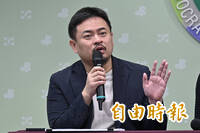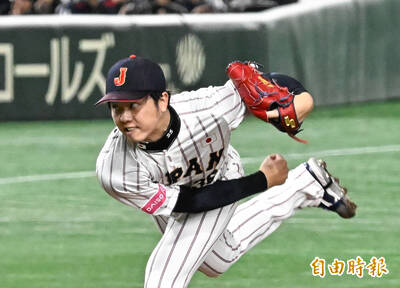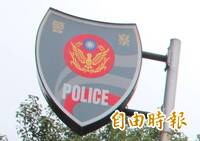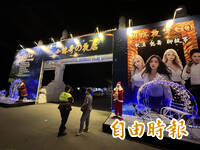《TAIPEI TIMES》 FTPA training sports drug consultants
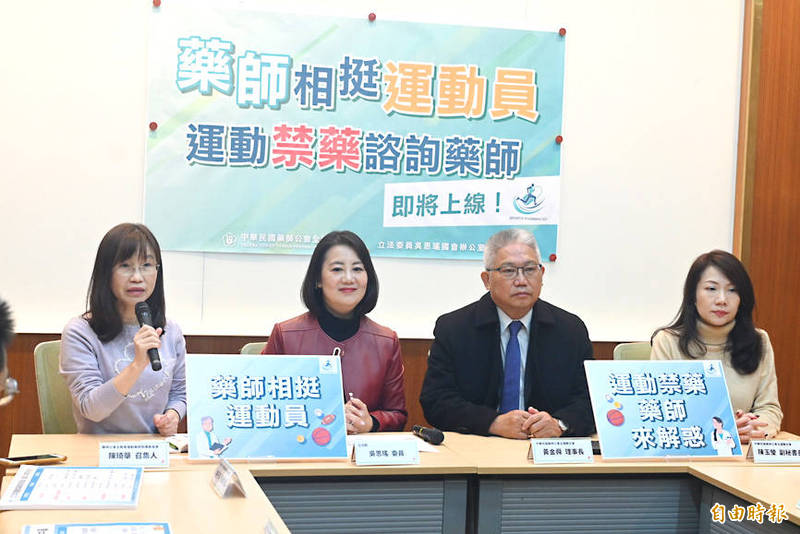
From left, convenor of the Federation of Taiwan Pharmacists Associations’ Sports Pharmacists Preparatory Committee Chen Chi-hua, Democratic Progressive Party Legislator Rosalia Wu and associations chairman Huang Jin-shun attend a news conference in Taipei yesterday. Photo: Wang Yi-sung, Taipei Times
AWARENESS: The pharmacist group wants to train more pharmacists to give sports consultations to athletes so that they do not contravene competition doping rules
By Lee I-chia / Staff reporter
The Federation of Taiwan Pharmacists Associations (FTPA) yesterday said it has begun training pharmacists to provide consultations on substanced banned in athletics, with 142 certified sports pharmacists having obtained certification.
Athletes are encouraged to consult with them before heading to competitions.
FTPA chairman Huang Jin-shun (黃金舜) said the World Anti-Doping Agency (WADA) publishes its List of Prohibited Substances and Methods each year, which includes substances that are prohibited either at all times or in-competition, which might lead to confusion. As such, many athletes have in the past few years contacted the federation, asking about proper drug use.
Huang said that with help from Democratic Progressive Party (DPP) Legislator Rosalia Wu (吳思瑤), the federation received funding from the Sports Administration and launched a training program on drugs banned in athletics for pharmacists last year.
Referencing Japan’s sports pharmacist system, the federation worked with the Chinese Taipei Anti-Doping Agency in holding training courses this year, which instruct the pharmacists on the WADA code, the list, therapeutic use exemptions, drug testing, results management and related knowledge. Pharmacists must also pass an end-of-program exam to receive certification.
“There are now 142 pharmacists that passed the exam and can assist Taiwan’s athletes,” Huang said, adding that their names are listed on the FTPA’s Web site and that the federation plans to train about 200 sports pharmacists next year, hoping some of them could accompany Taiwanese athletes to the Paris Summer Olympics next year.
The federation’s Sports Pharmacists Preparatory Committee convener, Chen Chi-hua (陳琦華), said that many substances are prohibited for athletes, either at all times or in-competition, including some Chinese herbal medicines and health supplements, so having specialized pharmacists to help athletes screen drug use would enable athletes to compete without fear of accidental doping.
For example, she said that pseudoephedrine — used to relieve nasal or sinus congestion — is prohibited in-competition, while beta-2 agonists — used to treat asthma; acetazolamide — for treating high pressure inside the eye and potassium-sparing diuretics — for treating hormonal acne in women — are prohibited at all times, she said.
There was a case in which an athlete had a fever before competing abroad and was considering forfeiting the competition, but with the help of a pharmacist who selected proper medications, the athlete participated and won a bronze medal, Chen said.
Each Japanese athlete is accompanied by a sports pharmacist when they compete, but Taiwanese athletes are only accompanied by physicians and physical therapists, so hopefully the Sports Administration could consider having sports pharmacists accompany athletes to international games, Huang said.
Sports pharmacists could join athletic trainers, coaches and counselors in assisting Taiwanese athletes, and although there are only 142 certified sports pharmacists so far, an “adoption” mechanism could be used, with pharmacists keeping track of certain athletes’ long-term drug use and helping to examine the drugs and supplements athletes take abroad before they head to international competitions, Wu said.
新聞來源:TAIPEI TIMES












